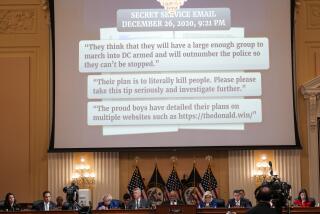U.S. Agents Crippled Iraq Terror Plans
- Share via
WASHINGTON — U.S. intelligence agencies helped arrange the arrest and detention of Iraqi agents, and in some cases persuaded them to switch sides, in a successful effort to cripple Saddam Hussein’s “plans for world terror” during the Persian Gulf crisis, former CIA Director William H. Webster said Thursday.
Webster’s comments at an American Bar Assn. committee breakfast represent the most extensive description by any U.S. official of the “proactive” campaign waged by U.S. intelligence and its counterparts worldwide to counter Hussein’s terror teams.
“Some said we overestimated the threat of terrorism in (Operations) Desert Storm and Desert Shield,” Webster told the ABA’s committee on law and national security. “Someday that tremendous story will be told of how the intelligence community assisted, aggressively and out front--I think the term used to be proactive--in working with liaison intelligence services around the world.”
Webster said the cooperative effort enabled U.S. officials to identify, arrest, detain and question members of the terrorist teams sent out by the Iraqi president. In some cases, Iraqi agents were persuaded to assist the United States and its allies through a process of recruitment “that prevented his original plans for world terror from ever taking place,” Webster said.
He did not indicate whether the Iraqis became double agents for the allies opposed to Iraq’s occupation of Kuwait or simply provided useful information.
“It’s a story that badly needs to be told--at the right time,” said Webster, who retired from the agency earlier this month.
Robert M. Gates, President Bush’s nominee to replace Webster, said during his Senate confirmation hearings last week that “the relative absence of terrorism in the period before, during and after the war with Iraq is one of the great success stories of the CIA.
“The agency had a remarkable amount of information on . . . Iraqis abroad that they thought had terrorist connections, or that might be involved in facilitating terrorist operations,” Gates told members of the Senate Intelligence Committee.
After some of that information was shared with foreign governments, many would-be Iraqi agents were expelled from the nations where they intended to operate, Gates said.
But Gates cited another reason for the lack of terrorist actions--the influence wielded by other Mideast governments over key terrorist organizations.
“The fact that those governments were sympathetic to our objectives in the war . . . led to them taking a role in helping to inhibit some of those terrorist activities,” Gates said.
In discussing the challenges facing the CIA, Webster said that “terrorism will not go away.” He said terrorism’s impact on individuals and their ability to travel, as well as on political leaders who are unable to counter it, “all have enormously destabilizing effects.”
The Times reported last February that unprecedented international cooperation and the expulsion of more than 100 Iraqi diplomats around the world had prevented Hussein from delivering on his threat to wage a campaign of terror against America and its allies.
At that time, a U.S. official who declined to be identified by name or agency said the expulsion of the Iraqi diplomats and other Iraqi terrorist agents “clearly thwarted his (Hussein’s) operational capabilities.”
Times staff writer Douglas Jehl contributed to this article.
More to Read
Sign up for Essential California
The most important California stories and recommendations in your inbox every morning.
You may occasionally receive promotional content from the Los Angeles Times.













